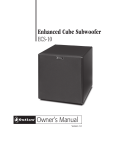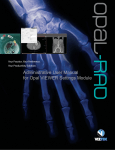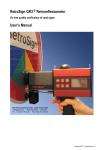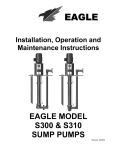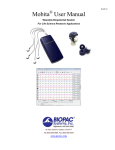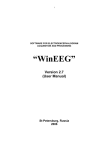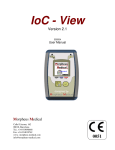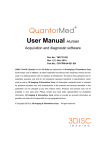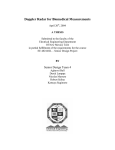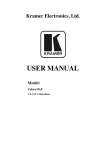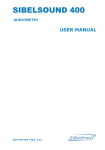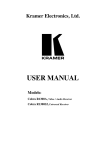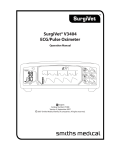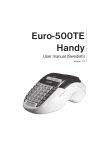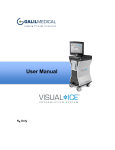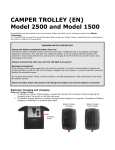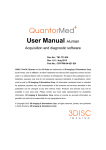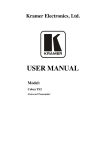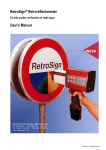Download Advanced Brain Monitoring, Inc.
Transcript
User Manual 42 Aero Camino Goleta, CA 93117 805 685‐0066 http://www.biopac.com/ Distributed by BIOPAC Systems, Inc. Manufactured by Advanced Brain Monitoring, Inc. 9.16.2014 Table of Contents Chapter 1: Introduction and Safety Information...................................3 A. About the B‐ALERT X10....................................................................................................... 3 B. Intended Use....................................................................................................................... 3 C. Safety .................................................................................................................................. 4 D. Minimum System Requirements ....................................................................................... 6 E. Items Required for Use ........................................................................................................ 7 Chapter 2: Sensor Headset Use...............................................................8 A. Charging .............................................................................................................................. 8 B. Preparation ......................................................................................................................... 9 C. Application ........................................................................................................................ 11 D. Additional ECG Placements............................................................................................... 14 E. Ready to Collect ................................................................................................................ 14 F. Post‐session Clean‐up ....................................................................................................... 15 A. Common Headset and Sensor Issues................................................................................ 17 Chapter 4: Specifications.......................................................................19 A. B‐Alert X10 ........................................................................................................................ 19 B. Environmental Conditions ................................................................................................ 20 Chapter 5: Compliance ..........................................................................21 A. FCC .................................................................................................................................... 21 B. General Compliance.......................................................................................................... 23 C. Software License Agreement............................................................................................ 24 D. Product Limited Warranty ................................................................................................ 24 E. Returns and Service .......................................................................................................... 25 F. Trademark Acknowledgements ........................................................................................ 25 BIOPAC Systems, Inc. B-Alert X10 User Manual | 2 Chapter 1: Introduction and Safety Information A. About the B‐ALERT X10 The B‐ALERT X10 is an internally battery powered FDA‐classified Type BF device intended for continuous use (7‐9 hours). The B‐ALERT X10 provides an integrated approach for wireless acquisition and recording of electroencephalographic (EEG), electrooculographic (EOG) and electrocardiographic (ECG) signals. The system utilizes the patented B‐Alert Sensor Headset and EEG sensors, which record high quality EEG that can be obtained in five‐minutes of set‐up time with no scalp preparation. The wireless technology allows the user to be untethered and move around the clinic (or in the field) while real time data is collected, displayed, and analyzed. The B‐ALERT X10 acquires nine channels of monopolar EEG recordings with a linked mastoid reference. The 10th channel is a programmable gain option that can be used for EOG or ECG. The B‐ALERT X10 consists of: Head and Host Units for bi‐directional transmission of digitized physiological signals, a Neoprene Strap, and a Sensor Strip with EEG sensor sites in the frontal (Fz, F3 and F4), central (Cz, C3 and C4) and parietal‐occipital (POz, P3, and P4) regions. The Sensor Headset collects physiological signals from the sensors placed on the user sampling at 256 Hz. The headset performs analog‐to‐digital conversion, encoding, formatting and transmitting of all signals. The signals communicate using a 2.4 to 2.48 GHz radio transmitter. B‐Alert Acquisition utilizes the bi‐directional capabilities of the system to initiate scalp‐electrode impedance monitoring, and monitors the battery capacity in the Head Unit. A custom USB Host Device (B‐Alert Dongle or ESU‐MC) is used as the base unit affixed to the PC workstation. B‐Alert Acquisition software consists of several modules that allow the user to acquire, store, view, and analyze physiological signals acquired by the wireless system. The software provides a simple graphical interface for establishing and controlling data acquisition. Patented algorithms can be selected to monitor artifacts that impact signal quality in real time, and provide users feedback when thresholds (for artifact) are exceeded. EEG Power Spectral Densities, EEG classifications, and Heart rate measures can be generated in real‐time or off‐line. B. Intended Use The B‐Alert X10 system is intended for use in clinical and research settings, by trained technicians, to measure and record the electrical activity originating from the brain (EEG), the BIOPAC Systems, Inc. B-Alert X10 User Manual | 3 heart (ECG), and the eye muscles (EOG), and store the data in an ebs or edf format. The system is intended for data collection only, and is not intended for treatment and/or any type of monitoring of patients in a medical environment such as surgery, intensive care unit, etc. Any medical diagnosis related to the EEG should only be derived by a certified Physician using medically approved software. The ECG and EOG are not intended to be used for any type of diagnosis or treatment. CAUTION! Read this manual carefully before using the B‐ALERT X10. C. Safety The B‐ALERT X10 is designed to be applied by a trained technician. There are a number of warnings and cautions throughout this manual. Read them carefully: they are important to the use of the product. The information in this manual has been carefully checked and is believed to be accurate. CONTRAINDICATIONS Do not use the B‐ALERT X10 in an MRI environment. Do not use the B‐ALERT X10 when alarms based on EEG classification are required. B‐ALERT X10 has no alarms classifications (such as drowsiness). There are only alarms for indications of excessive artifact. Do not use the B‐ALERT X10 as a substitute for clinical ECG. The B‐Alert X10 is a recording device, not a monitoring device. Do not use the B‐Alert X10 with high frequency (HF) surgical equipment. Do not use the B‐ALERT X10 in an environment where Defibrillation is common. WARNINGS Explosion Hazard. Do not use the B‐ALERT X10 in an explosive atmosphere. Explosion Hazard. Do not use the B‐ALERT X10 in the presence of flammable anesthetics or gases. Explosion Hazard. Do not use the B‐ALERT X10 battery recharging system with non‐ rechargeable batteries. EEG Leads, Strips and Sensor interfaces are not protected against the effects of defibrillation. Damage to the device is possible if worn during defibrillation. Not Defibrillator Proof. Additional equipment connected to the patient must comply with the requirements of IEC 60601‐1‐1. The PC used with B‐ALERT X10 must be placed outside the patient/client environment (more than 3 meters or 10 feet), or the PC must comply with IEC 60601‐1.1 BIOPAC Systems, Inc. B-Alert X10 User Manual | 4 Permanent Damage and/or Warranty Voidance. B‐ALERT X10 must be repaired by authorized personnel only. Any evidence of opening the system, field service by non‐ authorized personnel, tampering, or any kind of system misuse or abuse shall void the warranty. Synapse Conductive Electrode Cream is recommended for use with the EEG sensors. Use of any conductive gel, cream or electrolyte other than Synapse may affect signal quality or accuracy, or damage the EEG sensor. Avoid placement of EEG sensors or Synapse cream directly into an open wound. CAUTIONS – General The B‐ALERT X10 should only be applied by a trained technician. This model is not intended for in‐home use without the assistance of a technician. Position conductive parts of the EEG, ECG and EOG sensors so that they do not contact other conductive parts and earth. Do not spray, pour, or spill any liquid on the B‐ALERT X10, its connectors, switches, or openings, as this will cause permanent damage and void the Warranty. Do not use caustic or abrasive cleaning agents on the B‐ALERT X10 or on the EEG sensors, as this will cause permanent damage and void the Warranty. This device has been tested and found to comply with the limits for medical devices to the IEC 60601 standards. These standards are designed to provide reasonable protection for safety and against harmful interference in a typical medical installation. To minimize the possible hazard caused by the summation of leakage currents when several equipments are interconnected, the B‐ALERT X10 should be used in wireless mode only and should never be charged while being worn by the patient. Verify that all visible indicators illuminate during the startup (initialization) sequence. If any indicator is not lit, do not use the B‐ALERT X10. Contact BIOPAC Customer Support (pg. 25) for repair or replacement. CAUTIONS – Batteries Do not charge the batteries while wearing the Sensor Headset. Do not recharge batteries that have been fully charged. Follow local ordinances and recycling instructions regarding disposal or recycling of the device and device components, including batteries. Batteries may leak or explode if used or disposed of improperly. The internal Li‐Polymer batteries should only be replaced by the service department! BIOPAC Systems, Inc. B-Alert X10 User Manual | 5 D. Minimum System Requirements Personal computer (PC) with minimum PentiumTM 2.4 GHz processor; Minimum of 1 GB of installed RAM memory and 4 MB virtual memory; Windows XP or Windows 7 operating system; .NET framework version 3.5 installed; Minimum of 50 MB hard disk space per 5‐hour session; One CD‐ROM drive; VGA or higher resolution video adapter; One available USB port. Monitor size between 15” and 21” required for Baseline acquisition. BIOPAC Systems, Inc. B-Alert X10 User Manual | 6 E. Items Required for Use CD with installation, manual, and training videos B‐Alert X10 Sensor Headset Cleaning Tools ‐ Tweezers & Electrode Brush Foam Sensors 12cc Syringe ECG Leads (left) Mastoid (right) Disposable Electrodes Zip‐Linq Wall Charger & X10 Cable Adapter BIOPAC Systems, Inc. Neoprene Strap Sensor Strip Synapse Gel Bottle & Tube ABM USB Host device B‐Alert Dongle (left) Optional ESU‐MC (right) Tape Measure B-Alert X10 User Manual | 7 Chapter 2: Sensor Headset Use Note: This chapter presents a detailed, written process of a standard subject setup. For an additional demonstration, refer to the instructional videos provided with the included software. Brain map of a 9‐electrode strip. Front Back A. Charging The B‐Alert Sensor Headset should arrive fully charged and ready for use. For ongoing usage, it is recommended that you charge the headset the night before using. Fully charged headsets can record for at minimum 8hrs. It takes 2‐3hrs to fully charge a headset. To recharge the Headset follow the steps below. 1. Verify the Headset is in the off position. Insert the X10 cable adapter into the sensor headset. 2. Plug the Mini‐B connector into the X10 cable adapter and Cable Adapter the USB‐A connector into your computer’s USB port Mini‐B 3. Once power is recognized, the sensor headset will automatically begin charging, confirmed by a double blinking green LED pattern on the front of the headset. 4. Charging will automatically terminate once the batteries are fully charged, confirmed by a single blinking green LED pattern. LED Indicator BIOPAC Systems, Inc. B-Alert X10 User Manual | 8 B. Preparation 1. Preparing Sensor Headset a. Ensure that the fuzzy side of the Neoprene is facing out, and the strip connector triangle is Fuzzy side of neoprene pointing up. b. Using a clean Neoprene Strap, feed the Strap ends through each side of the Sensor Headset strap holders and fasten the Velcro. Do this equally to both sides, but leave loose for easy application to subject later. c. Verify that the Mastoid Leads are plugged into the system. Triangle Strip Connector Mastoid Leads 2. Preparing Strip a. Inspect the Strip and verify there are no rips or hard creases on the Strip itself. Check the entire strip, paying special attention to spots (circled in red) prone to rips and creases. BIOPAC Systems, Inc. B-Alert X10 User Manual | 9 b. Attach the foam pieces to the sensor sites. Ensure the foam is centered within the black circle to maximize the contact surface between the sensor site and the foam. c. Using the provided syringes with curved tip applied, fill each foam piece with synapse gel in one of two ways: i. Place the syringe in the hole of the foam and dispense gel. You should see the gel begin filling the center of the foam. ii. The gel can also be dispensed into the foam from the sides by pushing the tip into either side of the foam until it begins to fill the center. ii. i. d. Make sure to completely fill foam piece. Each sensor will hold 0.4‐0.6 cc of synapse gel. e. The foam should be saturated with gel and the center hole should be filled to the top. Size Medium Small BIOPAC Systems, Inc. Nasium ‐ Inion >34.5 cm 32.0 – 34.5 cm B-Alert X10 User Manual | 10 C. Application 3. Sensor Headset and Neoprene Strap a. Measure the distance from the nasium to the inion (occipital bone). a. b. Use an alcohol swab to wipe down areas where the sensors will be placed. Also clean Mastoid and ECG locations with an alcohol swab. c. Place the Sensor Headset onto the subject’s head and tighten the Neoprene Strap to provide a snug fit. Inion Nasium c. d. Verify that the Neoprene Strap is centered on the subject and that it is not resting on the ears. e. While holding the strip in front of the subject, with the foam pieces facing away from the face, attach the Strip to the front of the Neoprene Strap by feeding triangular tip through the hole adjacent to site Fz. d f. Carefully bring the Strip over the top of the subject’s head, verifying that the Strip is centered and that the subject’s inion is below the alignment hole. (See picture on next page). e BIOPAC Systems, Inc. B-Alert X10 User Manual | 11 f. g. While holding the Strip in place over the inion, take the two Strip Arms closest to the inion and attach them to the Neoprene Strap. h. Tighten the remaining Strip Arms in pairs, from the back of the head to the front, so that the Strip sits flat against the subject’s head, while maintaining the correct alignment on the scalp. h. h. g. i. Verify that all sensor sites are contacting the head and adjust straps if necessary. j. j. Gently plug connector on the back of the Strip into the Sensor Headset. The connection between headset and strip is snug; be gentle when plugging/unplugging. k. If the subject complains about discomfort from any electrode, loosen individual Strip Arms. BIOPAC Systems, Inc. B-Alert X10 User Manual | 12 4. Mastoids and ECG Leads BIOPAC Systems, Inc. B-Alert X10 User Manual | 13 D. Additional ECG Placements The B‐Alert ECG algorithms rely on peak to peak measurements to compute the beat to beat (and second to second) Heart Rate. The ECG signal is robust and the sensor placement is somewhat flexible. BIOPAC's recommended placement is to have the Left (bLue) ECG Lead on the lower most rib and the Right (gRey) lead on the right collarbone. Alternative ECG placements however can be used if the recommended configuration is not ideal for a given application. For alternative ECG placement, the appropriate leads must be placed across the heart (bLue lead ALWAYS on the Left side of participant and gRey lead always on the right side). The adhesive electrodes should be placed on boney parts of the participant, where there is little potential for movement (from breathing or muscles) which can compromise signal integrity. Contact BIOPAC for additional information on alternative ECG placement. E. Ready to Collect 1. Plug in the USB Host Device (B‐Alert Dongle or ESU) to an available USB port on the computer running B‐Alert Software. 2. Verify the Sensor Headset is synced to the B‐Alert Dongle by switching on the Sensor Headset and viewing the indicator lights on the front of the Sensor Headset. The Sensor Headset has established connection when the green indicator light turns solid after 5‐ seconds. If the red indicator light stays on while the green indicator light is blinking, the headset is not properly connecting. Refer to the AcqKnowledge Software Guide: Chapter Ϯϱ for details on how to re‐sync a Headset to the USB Host Device. Connected Not Connected 3. Maintaining BT Signal Quality: a. Make sure the Sensor Headset and B‐Alert Dongle are within 25 feet of each other. b. Minimize the number of obstructions (and avoid metal objects) in the line‐of sight of the head and host units. BIOPAC Systems, Inc. B-Alert X10 User Manual | 14 F. Post‐session Clean‐up 1. Removal of Sensor Headset and Electrodes BIOPAC Systems, Inc. B-Alert X10 User Manual | 15 2. Cleaning the Sensor Strip and Neoprene Strap CLEANING CAUTIONS: For optimal recordings, clean the strip immediately after use. Do not reuse foam sensors. Strips are recommended for 25‐30 uses. Do not aggressively scrub the Sensor pads when cleaning. If Sensor pad is removed from strip discontinue use of strip. When removing the sensor strip from the headset, DO NOT pull or jerk the connector. BIOPAC Systems, Inc. B-Alert X10 User Manual | 16 Chapter 3: Acquisition Troubleshooting A. Common Headset and Sensor Issues The following topics describe critical troubleshooting methods to undertake when encountering problems during the setup session of a subject. Hands should be away from Face! Part thick hair and add cream. BIOPAC Systems, Inc. B-Alert X10 User Manual | 17 NOTE: The recommendations are not necessarily listed in a logical sequence. Use best judgment to determine which trouble‐shooting tips are most relevant to the problem(s). BIOPAC Systems, Inc. B-Alert X10 User Manual | 18 Chapter 4: Specifications A. B‐Alert X10 System Specifications ‐ for Head and Host Units BT Specifications of the B‐Alert X10 RF Band Antenna Transmission Mode Data Transmission Range Average Data Loss Transmission Power 2.4 to 2.48 GHz (ISM band) On‐board Bi‐Directional ~ 30 feet, line of sight < 0.1% ~ 1 mW System Specifications of the B‐Alert X10 Power Supply Operating Time Power Consumption Battery Charger User Control Indicator LEDs Number of channels Sampling Rate Dynamic Range Resolution Bandpass Characteristics Noise On‐line Impedance Monitoring Up to 4 x 250 mAh 3.7 Volt Li‐Polymer Batteries 7.0 hours between charges ~ 40 mA @ 3.7 V External, interface via Charging Jack ON/OFF Green Red Ten 256 samples/second + 1,000 μV, sufficient for either EEG or EOG 16 bit 0.1 Hz and 65 Hz (at 3dB attenuation) obtained digitally with Sigma‐ Delta A/D converter 3.2 mV peak to peak out to 100 Kohms resistance Initiated by host computer using bi‐directional link for EEG Channels only 100 Gohm 22‐pin JST connector for Sensor Headset 5” long x 2.25” wide x 1” deep 4.0 ounces with batteries ABS Bluetooth Version 2.0, class 1 B‐Alert dongle Input Impedance Connector Interface Head Unit Dimensions Head Unit Weight Case Material Bluetooth Dongle Host Unit Software Personal computer with 1.5 MHz or higher processor 1 GB of RAM Compatibility running Windows XP Estimated File Size per Minute ~ 30 KB/Min/channel Recharging Batteries on Head Unit Provided by USB Port on Host 500 mA @ 5 Volts Workstation BIOPAC Systems, Inc. B-Alert X10 User Manual | 19 Recharging Cable Headset and Sensor Strip Sensors Electrode Cream B. 1 meter USB A to mini‐B connection to Charging Adapter Medium = Nasium to Inion ~36 cm. From Inion: POz = 7.2 cm, Cz = 18 cm and Fz = 25.2 cm. PET Strip with Silver‐Silver Chloride sensor sites interfaced with 100 ppi foam. Highly conductive, electrolytes and preservatives in non‐ionic, hypo‐ allergic base, buffered to skin pH Environmental Conditions Operation Transportation Storage 5oC to 40oC 41oF to 104oF ‐20oC to 70oC ‐4oF to 140oF ‐20oC to 70oC ‐4oF to 140oF ‐390 m to 3012 m ‐1254 ft. to 9,882 ft. ‐390m to 3012 m ‐1254 ft. to 9,882 ft ‐390m to 3012 m ‐1254 ft. to 9,882 ft 70 kPa to 106 kPa 20.6 in. Hg to 31.3 in. Hg 70 kPa to 106 kPa 20.6 in. Hg to 31.3 in. Hg 70 kPa to 106 kPa 20.6 in. Hg to 31.3 in. Hg 15% to 95% non‐condensing to be compliant with IEC 60601‐1, sub‐clause 44.5 15% to 95% non‐ condensing 15% to 95% non‐ condensing Environmental Condition Temperature Altitude Atmospheric Pressure Relative Humidity Note: Preliminary Specifications, subject to change. BIOPAC Systems, Inc. B-Alert X10 User Manual | 20 Chapter 5: Compliance A. FCC This equipment has been tested and found to comply with the limits for a Class B digital device, pursuant to part 15 of the FCC rules. These limits are designed to provide reasonable protection against harmful interference in a residential installation. This equipment generates uses and can radiate radio frequency energy and, if not installed and used in accordance with the instructions, may cause harmful interference to radio communications. However, there is no guarantee that interference will not occur in a particular installation. If this equipment does cause harmful interference to radio or television reception, which can be determined by turning the equipment off and on, the user is encouraged to try to correct the interference by one or more of the following measures: Reorient or relocate the receiving antenna. Increase the separation between the equipment and receiver. Connect the equipment to an outlet on a circuit different from that to which the receiver is connected. Consult the dealer or an experienced radio/TV technician for help. This device complies with part 15 of the FCC Rules. Operation is subject to the following two conditions: 1) This device may not cause harmful interference, and 2) this device must accept any interference received, including interference that may cause undesirable operation. Table 201 Guidance and manufacturer’s declaration – electromagnetic emissions The X10 is intended for use in the electromagnetic environment specified below. The customer or the user of the X10 should assure that they are used in such an environment. Emissions Test Compliance Electromagnetic environment ‐ guidance The X10 uses RF energy only for its internal function. Therefore, its RF emissions are very low and are not likely to cause any interference in nearby Group 1 RF emissions electronic equipment. CISPR 11 RF emissions CISPR 11 Harmonic emissions IEC 61000‐3‐2 Voltage fluctuations/ flicker emissions IEC 61000‐3‐3 BIOPAC Systems, Inc. Class B The X10 is suitable for use in all establishments, including domestic establishments and those directly connected to the public low‐voltage power supply network that supplies buildings used for domestic purposes. N/A N/A B-Alert X10 User Manual | 21 Table 204 Guidance and manufacturer’s declaration – electromagnetic immunity The X10 is intended for use in the electromagnetic environment specified below. The customer or the user of the X10 should assure that they are used in such an environment. Immunity IEC Compliance Electromagnetic environment ‐ guidance Test 60601 level test level Portable and mobile RF communications equipment should be used no closer to any part of the X10, including cables, than the recommended separation distance calculated from the equation applicable to the frequency of the transmitter. Recommended separation distance d = 1.2 P Conducted 3 Vrms 3 Vrms RF 150 kHz d = 1.2 P 80 MHz to 800 MHz IEC 61000‐ to 80 d = 2.3 P 800 MHz to 2.5 GHz 4‐6 MHz 3 V/m where P is the maximum output power rating of the transmitter in Radiated RF 3 V/m watts (W) according to the transmitter manufacturer and d is the IEC 61000‐ 80 MHz recommended separation distance in meters (m). 4‐3 to 2.5 GHz Field strengths from fixed RF transmitters, as determined by an electromagnetic site survey,a should be less than the compliance level in each frequency range.b Interference may occur in the vicinity of equipment marked with the following symbol: NOTE 1 At 80 MHz, the higher frequency range applies. NOTE 2 These guidelines may not apply in all situations. Electromagnetic propagation is affected by absorption and reflection from structures, objects and people. a Field strengths from fixed transmitters, such as base stations for radio (cellular/cordless) telephones and land mobile radios, amateur radio, AM and FM radio broadcast and TV broadcast cannot be predicted theoretically with accuracy. To assess the electromagnetic environment due to fixed RF transmitters, an electromagnetic site survey should be considered. If the measured field strength in the location in which the X10 is used exceeds the applicable RF compliance level above, the X10 should be observed to verify normal operation. If abnormal performance is observed, additional measures may be necessary, such as re‐orienting or relocating the X10. b Over the frequency range 150 kHz to 80 MHz, field strengths should be less than 3 V/m. BIOPAC Systems, Inc. B-Alert X10 User Manual | 22 Table 206 Recommended separation distances between portable and mobile RF communications equipment and the Model 600‐B & 610‐B The X10 is intended for use in an electromagnetic environment in which radiated RF disturbances are controlled. The customer or the user of the X10 can help prevent electromagnetic interference by maintaining a minimum distance between portable and mobile RF communications equipment (transmitters) and the X10; recommended distances are listed below, according to the maximum output power of the communications equipment. Separation distance according to frequency of transmitter Rated maximum output power of m transmitter 150 kHz to 80 MHz 80 MHz to 800 MHz 800 MHz to 2.5 GHz W d = 1.2 P d = 1.2 P d = 1.2 P 0.01 0.12 0.12 0.23 0.1 0.38 0.38 0.73 1 1.2 1.2 2.3 10 3.8 3.8 7.3 100 12 12 23 For transmitters rated at a maximum output power not listed above, the recommended separation distance d in meters (m) can be estimated using the equation applicable to the frequency of the transmitter, where P is the maximum output power rating of the transmitter in watts (W) according to the transmitter manufacturer. NOTE 1 At 80 MHz and 800 MHz, the separation distance for the higher frequency range applies. NOTE 2 These guidelines may not apply in all situations. Electromagnetic propagation is affected by absorption and reflection from structures, objects and people. B. General Compliance Item Equipment classification Type of protection Degree of protection against electrical shock Mode of operation Degree of protection against ingress of water/liquids Degree of Safety in presence of flammable mixtures Applied sensor label to indicate Type BF applied part Attention Symbol, consult accompanying documentation External case made with non‐conductive plastic Case mechanically strong Compliant With Safety Standards: IEC 60601‐1, CSA 601.1, EN865, EN/IEC 60601‐1‐2 2nd edition Internally powered by battery Type BF – Applied part Continuous IEC 60601‐1, sub‐class 44.6 IPXO IEC 60601‐1, sub‐clause 5.5, Not suitable IEC 60601‐1 Symbol 2 of Table DII of Appendix D IEC 60601‐1 Symbol 9 of Table DI of Appendix D IEC 60601‐1, sub‐clause 16(b) IEC 60601‐1 BIOPAC Systems, Inc. B-Alert X10 User Manual | 23 CAUTION: Changes or modifications not expressly approved by Advanced Brain Monitoring, Inc. could void the user’s authority to operate the equipment. C. Software License Agreement The purchase of a B‐Alert X10 sensor headset entitles the Purchaser a nonexclusive, single‐use software license (“Software”) from Advanced Brain Monitoring, Inc. subject to the following conditions: The Purchaser may install the Software on only one computer, make one copy in machine readable form solely for backup purposes, provided that you reproduce all proprietary notices on the copy; and physically transfer the Software from one computer to another provided that the Software is used only on one computer at a time. The Purchaser may not copy, distribute, rent, lease, sub‐license, transfer or use the Software except as allowed herein. The Purchaser may not alter, modify, decompile, translate, disassemble the Program; or use it to create a derivative work. Purchaser’s right to use this Software automatically terminates upon failure to comply with any provision of this License or upon your destruction of all copies of the Program and documentation. Purchasers in good standing will be offered future improvements or upgrades to the Software. If Purchaser purchases an upgrade version of the software, it constitutes a single product with the Software that the purchaser upgraded. This License is deemed made, accepted and delivered in the State of California and shall be construed, interpreted and governing by the laws of the State of California, without regard or effect given to its or any other jurisdiction’s conflicts of law jurisprudence. D. Product Limited Warranty The B‐Alert X10 Sensor Headset product is warranted to be free from defects in material and workmanship under normal use and service for a period of 180 days from the date of delivery. The obligation of Advanced Brain Monitoring, Inc. under this warranty is limited to repair, re‐work or replacement at Advanced Brain Monitoring, Inc.’s option, of any Sensor Headset product which, within the 180 days from date of delivery, is examined and determined by Advanced Brain Monitoring, Inc. to be defective. Advanced Brain Monitoring, Inc. will not be responsible for, and the warranty shall not apply to, any damage caused by the following: natural disasters, war, civil disturbances, abuse, misuse, negligence, usage of incorrect electrical supply voltage, usage not in accordance with the operation instructions manual, or normal wear and tear. This warranty shall not apply to any Sensor Headset product which has been repaired, serviced, disassembled or modified by any party other than Advanced Brain Monitoring, Inc. No warranty claim will be allowed for Sensor Headset products damaged by improper use, operation or handling after delivery of the Sensor Headset product. Purchaser must file all claims resulting from damage in transit with the carrier or carrier’s agent. Expenses incurred in connection with claims for which Advanced Brain Monitoring, Inc. is not liable may be charged to the Purchaser. Upon submission of a warranty claim, Purchaser is deemed to have waived any and all other claims against Advanced Brain Monitoring, Inc. Advanced Brain Monitoring, Inc. shall in BIOPAC Systems, Inc. B-Alert X10 User Manual | 24 no event be liable to Purchaser or to the Purchaser’s customers for any incidental or consequential damages, loss of use or other commercial loss, however occasioned. ADVANCED BRAIN MONITORING, INC. MAKES NO WARRANTIES, EXPRESSED OR IMPLIED, INCLUDING WITHOUT LIMITATION, WARRANTIES OF MERCHANTIABILITY, FITNESS FOR PARTICULAR PURCHASE OR PERFORMANCE CHARACTERISTICS, EXCEPT TO THE EXTENT SET FORTH HEREIN. E. Returns and Service The solid‐state circuitry within the B‐ALERT X10 Sensor Headset requires no periodic maintenance or calibration other than long‐term battery replacement. For the Warranty to remain in effect during the Warranty Period, all repairs must be performed by Biopac Systems, Inc. Biopac Systems, Inc. is not responsible for any damage resulting from service work performed by the customer or its representative. All returns to Biopac Systems, Inc. must include a Return Merchandise Authorization (RMA) obtained by calling Customer Support at (805) 685‐0066. Be prepared to provide: 1) your name, address, and telephone number; 2) the Sensor Headset model and serial numbers; and 3) an explanation of the problem. The Customer is responsible for all shipping, tariff and custom costs associated with the return or repair of the Sensor headset. F. Trademark Acknowledgements B‐Alert is a registered trademark; B‐Alert Sensor Headset is a trademark of Advanced Brain Monitoring, Inc., Carlsbad, CA. Synapse is a registered trademark of Med‐Tek/Synapse, Arcadia, CA. All other products or brand names are trademarks or registered trademarks of their respective companies. Copyright © 2010 Advanced Brain Monitoring, Inc. All rights reserved. BIOPAC Systems, Inc. B-Alert X10 User Manual | 25

























